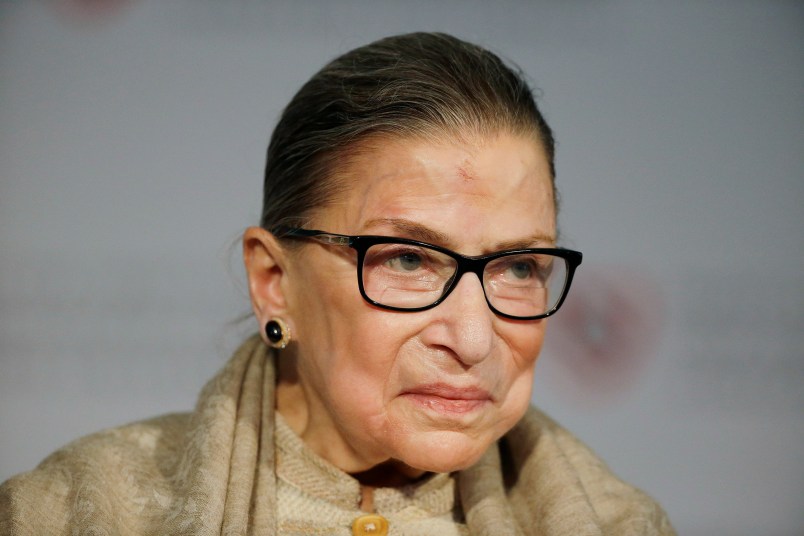Count Wednesday’s hearing on a challenge to the Obamacare contraceptive mandate among the cases where the stakes have been somewhat defused by Justice Antonin Scalia’s death. The religious non-profits bringing the case face an uphill battle with their arguments that the accommodation granted to them to opt out of the birth control coverage mandate is still a burden on their religious beliefs.
Even before Scalia’s unexpected passing last February, the case was already considered somewhat of an overreach by the conservative forces pushing the court to take up the challenge. But without Scalia’s fifth vote, the challengers will need to sway the vote of one of the court’s four liberals — who all signed on to most of Justice Ruth Ginsburg’s scathing dissent defending Obamacare in Hobby Lobby — or hope for a 4-4 split decision that punts the case until Scalia’s seat is filled.
The case, Zubik v. Burwell, is actually a consolidation of seven cases, including the lawsuit brought by the Little Sisters of the Poor. The challengers are all religious non-profits — David Zubik, for instance, is a Catholic bishop bringing the case on behalf of schools and charities run by his diocese — and they argue that the process of applying for an exemption to the Obamacare contraceptive mandate violates the federal Religious Freedom Restoration Act (known as RFRA). They say that even filling out the form claiming a religious objection to covering birth control — and thus triggering the process for employees to receive contraceptive coverage from outside their employers’ insurance plans — is a burden on their religious beliefs, as they oppose some of forms of birth control covered by the law.
So far, most courts — including many appeals courts — have rejected this argument. But last September, the 8th U.S. Circuit Court of Appeals ruled in favor of the challengers. Disagreement among the appeals courts increases the likelihood the Supreme Court takes a case, and it agreed in November to hear the consolidated cases. Beyond Obamacare’s mandate, the case posed an opportunity for the court to weigh in the scope of the RFRA as it applies to other issues, such as whether pharmacists can refuse to fill birth control prescriptions or cake bakers can deny their services to gay weddings.
When they were anticipating a nine-justice court, those supporting the government were optimistic that Kennedy would rule in favor of Obamacare this time around and that optimism carries over now that Scalia’s death deprives the conservative bloc a crucial vote.
“We’re confident in the outcome of this case,” said Gretchen Borchelt, the vice president for reproductive rights and health at the National Women’s Law Center, on a press call with reporters last week. “That decision would clearly land [Kennedy] on on the side of upholding the accommodation, so we’re confident in a 5-3 decision here.”
Borchelt pointed to Kennedy’s concurring opinion in Hobby Lobby where he stressed the government’s compelling interest in ensuring birth control coverage for women. The challengers are arguing in Zubik that the goal of contraceptive coverage for the organizations’ employees does not amount to a compelling interest.
But even if Justice Anthony Kennedy swings with the conservatives, a tie ruling will defer to lower court decisions favoring the government’s arguments — albeit without setting a national precedent that would resolve the larger question.
“That would create a complicated situation, because at least one lower court has ruled in favor of the religious organizations,” Lori Windham, senior counsel at the Becket Fund for Religious Liberty, which is representing Little Sisters, told TPM. “So if the court were to split, you would see some parts of the country having a different rule of law than other parts of the country.”
The court, of course, could come back to the issue again once Scalia’s seat is filled: either by listing the case for a re-argument with a ninth justice, or taking up another one of the related petitions once a nominee is confirmed. But with Senate Republicans vowing a blockade of President Obama’s nominee Merrick Garland, the filling of that ninth seat could take well over a year.







…and OH what fun will transpire during this time period. I’m not sure it will turn out quote as hoped by those who see obstruction as the best way to get their way these days…Yeah, we’re looking at you Sen. Toomey and all your “let’s let the people decide” buddies.
With any luck, their decision will have you out of office within the same year.
I don’t get why the media isn’t focusing on the colossal waste of time and money it is to litigate something in front of the Supreme Court and get no decision because of a split.
would someone PLEASE file a lawsuit against these ‘charitable’ organizations over their tax exemptions… I use the term ‘charitable’ with some ambivalence because I realize that there are actual people doing really good work on the margins but whe they allow themselves to be what appear to be sacrificial pawns in a long game to curtail someone else’s rights it kinda rubs the wrong way…
if I’m agnostic or atheist I don’t get any tax break… sorta like when the marriage and kid deductions were grossly inequitable against single people…
Because that ratfuck Scalia is pushin’ up daisies.
That’s why they’re upbeat.
Companies that object to contraception coverage probably have generous maternity/paternity leave benefits. Not.